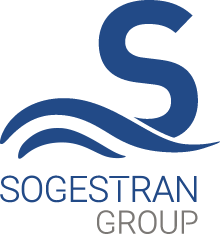Careers
Our human resources policy

Our human resources policy
The success of the Sogestran Group is linked to the skills that the men and women of the company deploy in the day-to-day use of our fluvial and maritime units, in France and around the world, and always for our client’s satisfaction.
- Apprenticeship and continuing education are therefore the first founding principle of our HR policy, to safely operate our boats today while imagining those of tomorrow.
- Internal promotion and professional mobility are the second founding principle, to meet the needs of the company and the aspirations of our teams. The continuous success of the Sogestran Group since its creation is based on the fact that it has always attracted talent by means of its internal promotion policy which has allowed many sailors to become captains in our fluvial business.
- Commitment is the third founding principle of our HR policy: it is one of the important values of the Sogestran Group, and part of our vision.
It is above all a collective daily challenge because commitment cannot be imposed - it is stimulated. It is the result of the gratification of working together in an environment of safety, quality, attentiveness and respect.
The Sogestran Group management charter
In the Sogestran Group, our managers have written a management charter to encourage this commitment. This charter reflects the human ambition of the group to lay down the managerial rules that it wishes to see applied globally to actualize the pleasure of working together.
Professions for passionates
Photos © Philippe Anessaut, Samuel Salamagnon & Sogestran Group
Join us!
The Sogestran Group consists of committed women and men.
Embark on your adventure!
You're looking for...
- An inspiring job in a unique working environment that's always on the move;
- An outdoor job;
- A variety of tasks (driving, mechanics, mooring, maintenance, guiding, etc.);
- A profession that offers autonomy and responsibility;
- Teamwork and community life;
- A career in which you'll be given opportunities to evolve;
- A profession that is part of responsible and sustainable transport;
- Interesting working patterns (7 days on board / 7 days ashore);
… Join us!
Founded in Le Havre in 1948, the Sogestran group is the leading inland waterways shipping company in France. We are now operating all over France and Europe. We navigate the Seine, the Rhône, the Loire, the Rhine, the Danube, etc.
The Sogestran group also includes other core businesses: maritime transport, multimodal transport and services to industry.
Our values: Trust, Agility, Pride, Commitment.
Testimonies from river transport operators:
The men and women who work in our teams are passionate - find out more about their professions below!

What are your main tasks?
I'm mainly assigned to the bunkering convoy that consists of the pusher Val d'Argoat coupled with the barges Gwen and Du. We supply ships calling at the port of Nantes St-Nazaire with LPFO (oil products).
This is done by loading the product at the Donges refinery and then delivering it to the ship while complying with safety and environmental regulations.
What do you like most about your job?
Ever since I started working, I've always been on the waters. I need that connection with the river or the sea.
I enjoy having a diversified activity: when we're not transporting, we're maintaining the units (mechanical work, cleaning, painting, etc.).
What have been the main steps in your career?
When I was 17, I started out as a fisher seaman.
At 21, I became a master fisherman.
At 28, I was hired on fixed-term contract by a CFT service provider and started working on coal convoys. Two years later, I was recruited on a permanent basis by CFT, as a deckhand.
At CFT, I climbed the ladder one step at a time. I started as a deckhand, then became an engine watchman, then a mechanic on board the units.
The most important step was being promoted to captain in April 2023, at the age of 46.
Testimony published in January 2024
The chief captain is responsible for the unit entrusted to him and for the crew placed under his orders during his embarkation periods.

What is your current position?
I have held the position of Helmsman since the first of June 2023. I've been within the company for 6 ½ years.
What are your main tasks?
I carry out the deckhand's work (mooring, loading, unloading), carry out maintenance and drive the unit.
I'm also responsible for filling in and completing the various on-board documents.
What do you enjoy most about your job?
What I like the most about my job is being on the move, being outside, not behind a desk. I also enjoy having autonomy within our unit.
The working environment is important too: every day I enjoy the scenery along the Seine.
What are the main steps in your career?
My family have been sailors for several generations.
From the age of 6, at weekends and during the holidays, I used to climb aboard the ships where my father and grandfather worked, and I liked it straight away: I love shipping as well as travelling and working in tandem on a boat. I quickly realised that I wanted to make a career out of it.
I joined a specialised class at the CFA de la navigation intérieure, with one week at school and one week on board a riverboat, then enrolled at the age of 16 for the CAP fluvial and followed that up with a Bac pro fluvial. I joined CFT as an apprentice. During my studies, I was able to get the CRR fluvial (VHF diploma) and pass my river driving licence.
After my apprenticeship, CFT offered me a permanent contract and I became a helmsman, i.e. a sailor learning to drive a boat. I then went on to take other diplomas and certificates such as the CRR Maritime, the Radar and the ADNs for working with dangerous goods.
Today, I'm a helmsman. I can therefore drive the units independently under the orders of my captain and I intend to continue growing in this company.
While on duty, the Helmsman Driver is responsible for driving and manoeuvring the unit or convoy to which he is assigned, taking over from those who have permanent responsibility for it. When he is not at the helm, he carries out the tasks assigned to the deckhands.
Discover Antonin's testimonial on video when he was a helmsman:
Testimony published in January 2024
To find out more about the job of helmsman:
Visit the Matelot Transport fluvial page, on the OPCO Mobilités website (French language).
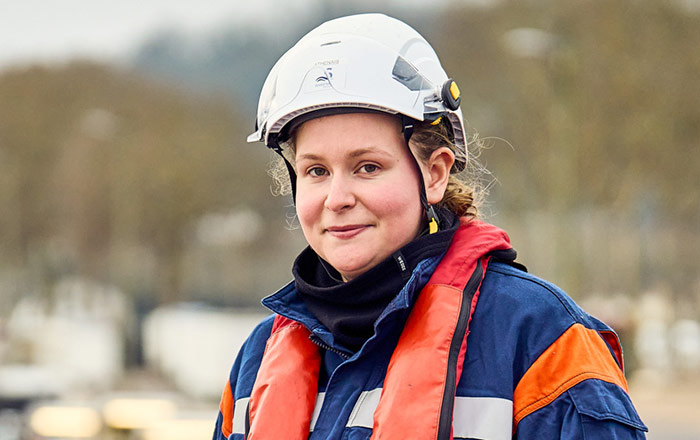
Hello Athénaïs, thank you for sharing your career and experience with us. To begin, what led you to choose a career on the water and what position do you currently hold?
With a father who was a fisherman and a grandfather who also worked on the water, my choice might seem obvious. Because of how tough his job was, my father didn’t encourage me to follow in his footsteps aboard a fishing boat. But I loved going with him and for me, it quickly felt like the right path. I just chose a different route — river navigation.
I studied at the CFA for inland navigation in Le Tremblay and joined CFT as an apprentice deckhand. My first boat, the Biarritz, left a lasting impression on me.
I progressed from deckhand to helmswoman, learning to steer under the captain’s supervision. I really enjoy piloting, which is why I obtained the necessary certifications to one day become a captain myself.
Why did you choose this profession?
Quite simply, I feel at home here. When you're navigating, the scenery is always changing, and a good portion of the work takes place outdoors, which I find really enjoyable.
I’m curious by nature and I love how versatile this job is. I’ve learned the various skills involved in deck work and I’m now developing those required for piloting. It’s fascinating, because it requires knowledge of both the vessel and the river.
There’s also the bond you form with your unit. When you live aboard 24/7, you really get to know it — its strengths and its quirks. It's like a real relationship!
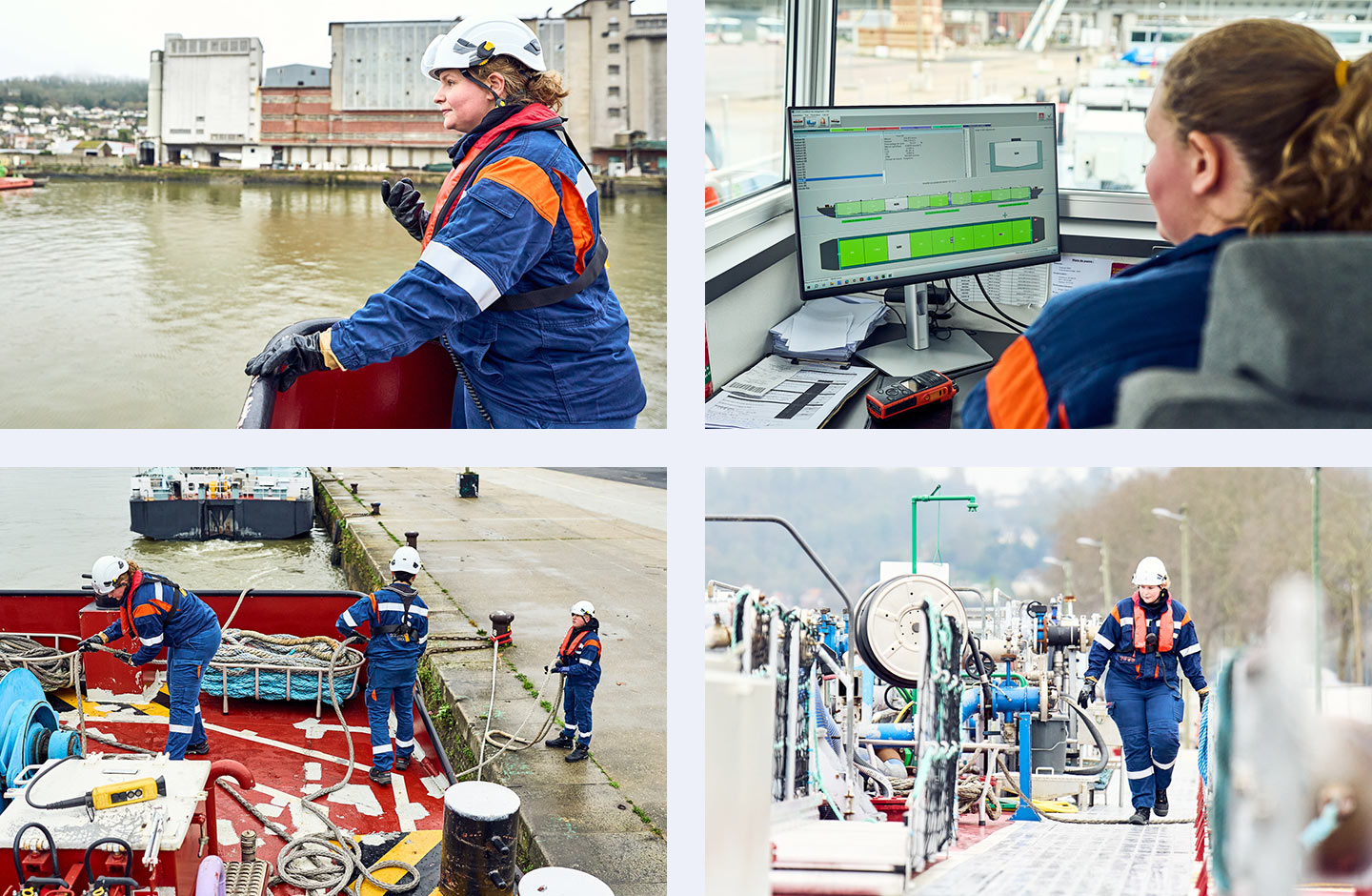
Any advice for a new deckhand?
My first piece of advice: listen to your captain. Getting to know them well helps you anticipate their expectations and makes communication easier, especially during key or high-risk maneuvers.
Don’t try to skip steps: you need to be a good deckhand before you can be a good captain.
And even though this environment is still mostly male, these careers are absolutely open to women — they shouldn’t hesitate to take the plunge.
Testimony published in April 2025
To find out more about the job of helmsman:
Visit the Matelot Transport fluvial page, on the OPCO Mobilités website (French language).

What is your current position?
I've been a deckhand on the self-propelled Mizar since September 2023.
What are your main tasks?
My tasks are varied: I guide the captain to lock entrances and wharves, I handle moorings, and I take part in commercial operations.
I also maintain the boat (sanding, painting, washing, etc.) and take part in community life (cooking, cleaning, etc.).
What do you enjoy most about your job?
What I like most about my job is sailing: you have a feeling of freedom and tranquillity, far from the hustle and bustle of the world 'ashore'. There's no pressure, everyone does their job and everything runs smoothly.
What are the main steps in your career?
I've been immersed in this environment since I was born, because my father is a captain on the Rhône. At first, I wanted to follow a different path, so I did a professional baccalaureate in commerce, followed by a first year of a Tourism BTS.
Then, while working with my father one summer, I discovered the profession and I really liked it. I enrolled at the CFANI to do a professional baccalaureate as an apprentice, which I obtained in June 2023.
I was then hired by CFT Gaz in September 2023.
Testimony published in March 2024
The deckhand performs all the tasks required for the running, steering, guiding, manoeuvring and safety of the convoy, as well as cargo and crew services. They are involved in provisioning, galley preparation and maintenance.

What is your current position?
I'm a mechanic on board the self-propelled Eridan. I sail on the Rhône.
What are your main tasks?
My main tasks are twofold. On the one hand, I carry out routine maintenance on the main engine and its auxiliaries (pumps, for example): oil changes and refills, GNR filters, oil and air changes, etc.
On the other hand, I carry out external on-board maintenance, such as painting and cleaning the self-propelled vehicle. I also place orders and work requests for the technical department.
What do you enjoy most about your job?
What I like most about my job is the variety of maintenance work on different devices, both on deck and in the machinery. Above all, I enjoy being self-sufficient and versatile.
What are the main steps in your career?
After a first year of BTS in production engineering, I joined the French Navy. There I obtained my basic certificate, a certificate of technical aptitude and then a higher certificate in naval mechanics.
These qualifications enabled me to carry out a wide range of missions on different naval vessels and units (aircraft carriers, patrol boats, firefighters, commandos, etc.).
After 20 years in the Navy, I left for civilian life, obtained a certificate and joined the boatage service in Sète.
I then decided to change career again: after 10 years, I left the boatage to learn another profession, that of river transport.
At the age of 49, I was hired as an enginesman deckhand by CFT.
Today, I'm a mechanic and hope to progress in this field and acquire new skills (SST, survival at sea, DNA chemistry, etc.).
Testimony published in March 2024
The mechanic starts up and maintains the engines and checks the boat's mechanical, hydraulic and electrical components. He is the machine contact for his management and the shore-based technical departments during his periods on board. He or she is also called upon to take part in on-deck operations.

After completing my Seconde générale without much conviction, I decided to take a CAP Navigation fluviale, a course I discovered because of my location close to the Seine.
It seemed like a job that would suit me perfectly, because it offered a certain amount of autonomy and freedom, which was confirmed later on.
So I took a CAP, a Mention complémentaire and a Bac pro on a work-study basis, passed several licences and obtained various certificates (River code, 180M licence, ADN, CRR, etc.).
My work-study placements took place in different companies: I was an apprentice at Lafarge, on a self-propelled ship and finally with CFT, a company that taught me to adopt the right gestures and follow the right procedures in every high-risk situation, which helped me to improve in my work.
Finally, after two years' apprenticeship, I was offered a permanent contract. What's more, CFT has already given me a place on its school pusher, the Obstine, to train me to drive 180 m convoys.
More great opportunities for development to look forward to...
Testimony published in October 2018
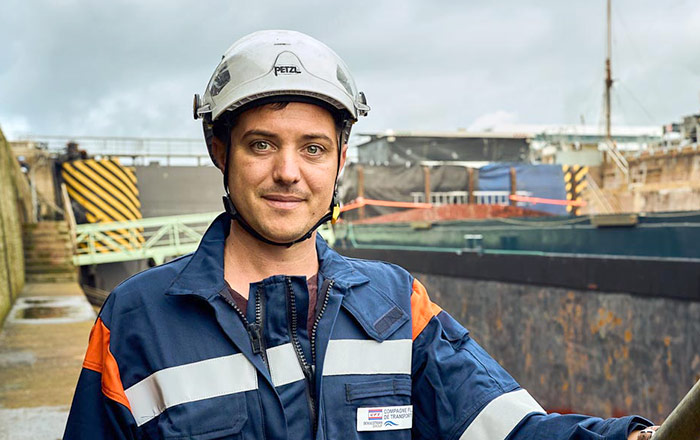
Hello Antoine, to begin with, can you tell us about the major steps in your professional career?
I joined CFT Seine in 2013, as part of a BTS in industrial maintenance.
I then went on to complete a vocational degree in port and ship maintenance in Brest, still on a sandwich course with CFT Seine. At the end of my training, I was offered the chance to join CFT Seine's technical department as a maintenance manager.
What are your main missions?
I'm responsible for the technical and regulatory monitoring of some twenty river boats (pushers, barges, self-propelled vessels) dedicated to the transport of goods (containers, tankers, urban distribution, etc.).
I organize the various preventive maintenance tasks and technical stoppages using our CMMS tool (Carl), which enables us to track each boat and piece of equipment on board according to the maintenance schedules we have defined. I also prepare the administrative files needed to obtain or renew the certifications required for operation (Union Certificate, Class, DNA, etc.).
In the event of a breakdown, I'm one of the main technical contacts for the crews. I also manage parts inventories and technical purchases.
In September and October, you worked on the Oural's five-year technical shutdown. Can you tell us how it's being carried out?
The technical shutdown (TS) begins with a crucial preparation phase, during which I define the scope of the work, consult with contractors and draw up a precise estimate of the project. This stage enables me to optimize time and resources during the shutdown. During the stoppage, I spend about half my time in the field to :
- monitor work progress and coordinate service providers to meet the project's deadlines;
- draw up and validate safety documents (work permits, fire permits, etc.);
- supervise the application of safety instructions through regular inspections;
- deal with unforeseen circumstances, whether related to working conditions or unplanned work, while ensuring the safety of those involved.
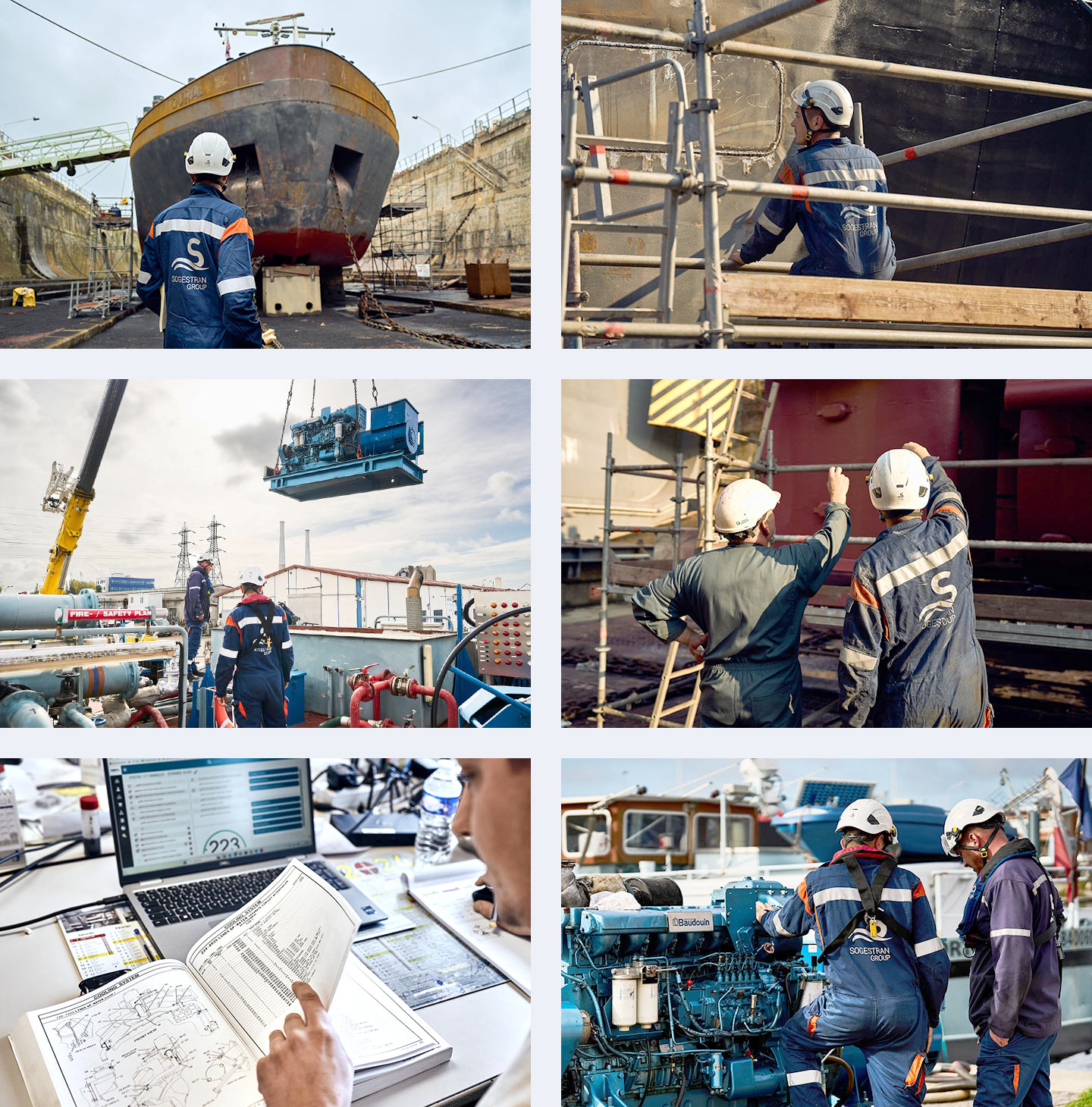
What do you love most about your job?
What I like most is versatility, because no two days are alike. Every situation brings its own set of challenges, which means you learn a lot.
I also like the flexibility: I organize my work as I see fit, depending on the projects I'm working on. Of course, this also means being highly available.
What qualities do you think it takes to be a good maintenance manager?
To a young person who wants to become a maintenance manager, I would say that you need to develop basic technical knowledge in all fields, as well as good organizational and interpersonal skills (essential when there may be 20 to 30 people on board at the same time).
You need to enjoy travelling, in order to be able to visit units on a regular basis.
And above all, you need to be or become passionate!
Testimony published in December 2024
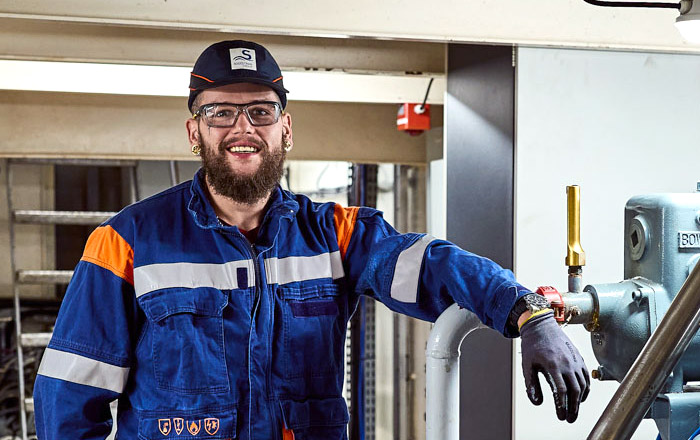
Hello Charles, thank you for taking the time to tell us about your unusual career path, which led you to become a sailor!
So, in terms of studies, I started my professional life with a CAP in cookery. I worked in restaurants, but I didn't really get hooked, which led me to explore other paths.
I went from one job to the next: mover, handler, warehouseman...
In 2019, I joined Mahieu Maintenance. I first worked for six months at Le Havre, then was assigned to the Le Trait site, where I took part in barge repairs. Tasks varied according to the needs: dismantling, welding, painting and so on.
At the end of these contracts, I was offered the chance to move up from sedentary to navigating. I said to myself: why not? That was in September 2019. Wow, I realize it's already been five years... time flies.
The training took place on board, with specific certifications (like ADN) adapted to our operational needs.
As I like to work with my hands, I decided to become an engine guard. At the end of the year, with three colleagues, we took the 250 kW mechanic training course.
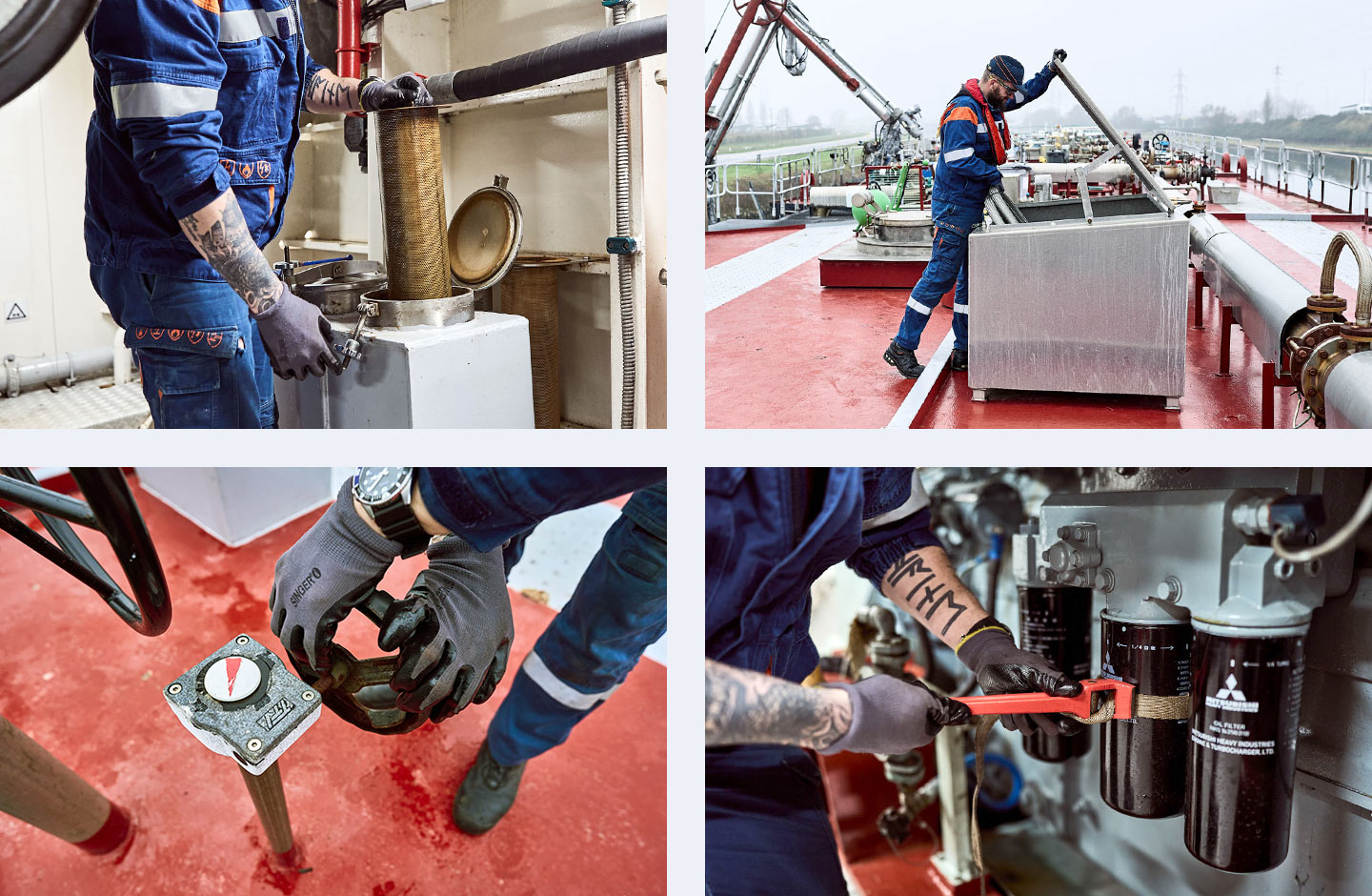
You said “It's already been five years”, how quickly does time fly?
Time flies when you appreciate what you're doing and the environment in which you're doing it! First of all, there's my job as a deckhand, with tasks that vary according to the situation: navigation or loading/unloading operations. Then there's my job as an engine guard, with specific tasks such as routine engine maintenance (oil changes, lubrication, inspection).
What I particularly like about mechanics is finding solutions when a problem arises. And more recently, thanks to the training we've undergone, it's a real plus when it comes to diagnosing problems and smoothing communication with the maintenance staff.
And then there's our life on board with our colleagues. It's a very different rhythm from not going home every night. As far as I'm concerned, it's a rhythm that suits me.
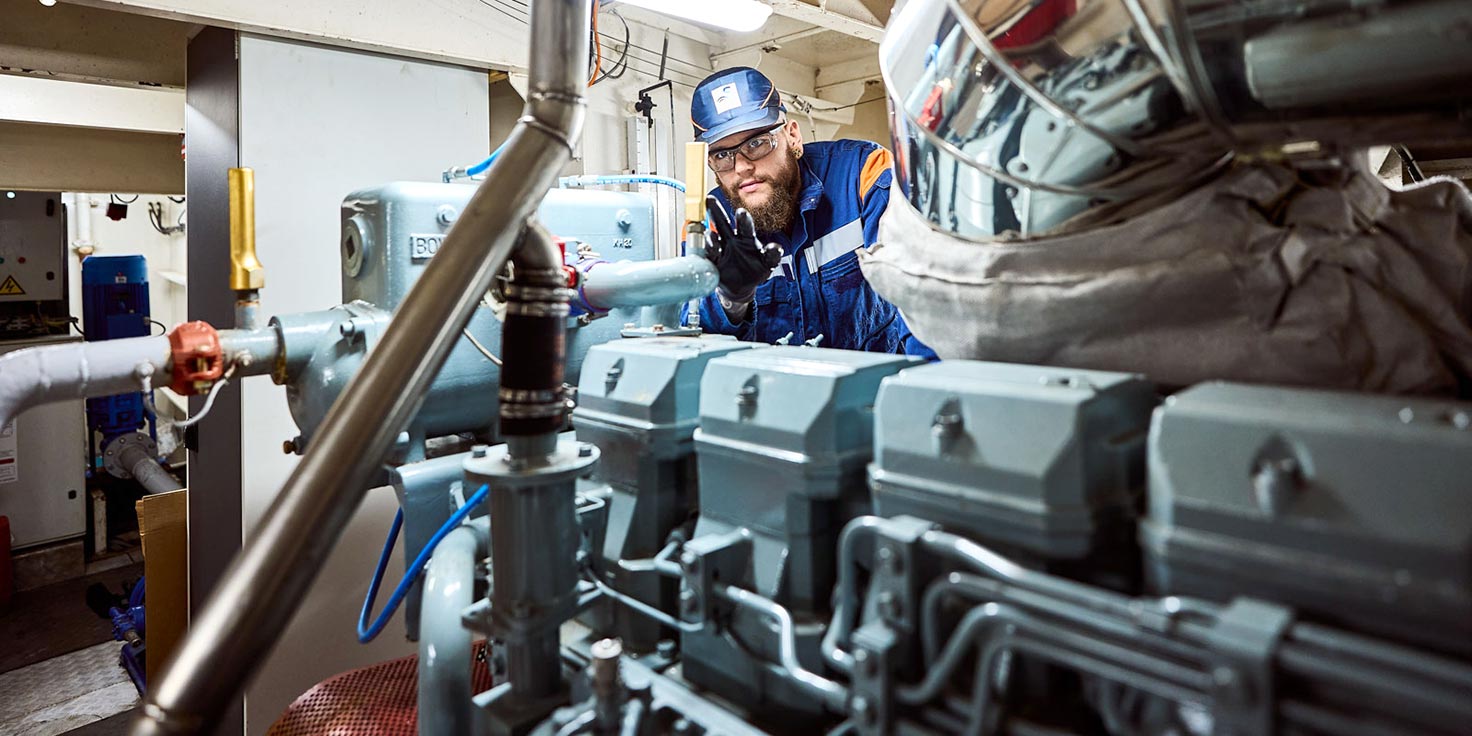
What advice would you give to a young deckhand starting out his career?
We're transporting dangerous products, so you shouldn't rush. Sometimes, trying to do things too well can lead to mistakes. You have to dare to ask questions to colleagues: people share on board, and they're open-minded. At the very beginning, it's better to ask before doing!
You have to stay open and listen. The more you sail on certain units, the more you get to know them, recognize their noises and how they work. However, it's important to stand back and never let your guard down.
Testimony published in February 2025
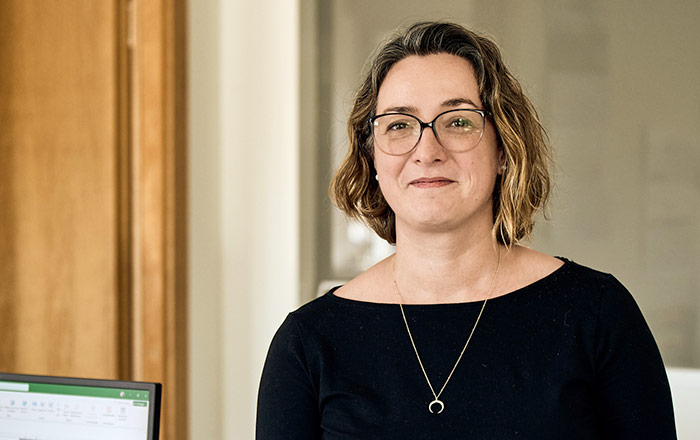
We're heading for Loire-sur-Rhône, south of Lyon, to find out more about CFT Gaz, a specialist in the transport of liquefied gas on the Rhône between Lyon and Fos/Lavéra.
Hello Jenny, can you tell us about your work at CFT Gaz?
CFT Gaz being a small organization, I'm wearing two hats.
The first is that of Operations Manager: I plan and supervise the transport of two self-propelled tankers and two barges on the Rhône, from Lyon to Fos-sur-Mer. My responsibilities range from creating the trip in the information system to invoicing, including managing crew rotations and coordinating with our customers, as well as with the port operator in Lavéra.
The second is that of human resources assistant for around twenty sailors. This role includes managing schedules, training sailors and preparing payroll. I'm also in charge of recruiting seagoing personnel and monitoring their safety equipment, in collaboration with the site's QSE manager.
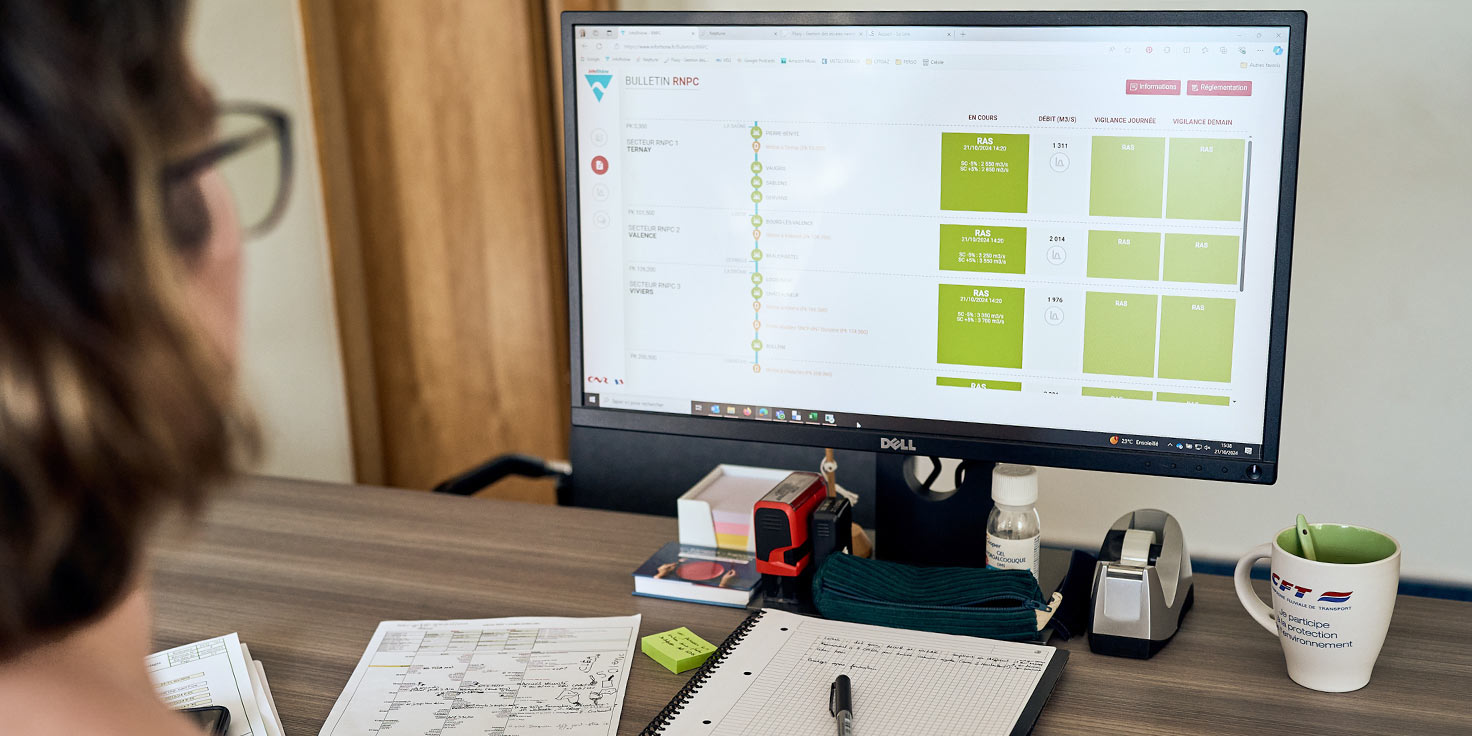
What led you to transport?
River transport is a family story: I'm the daughter of boatmen.
However, after obtaining a BTS in Transport, I began my professional life in combined rail/road transport. In 2005, I seized the opportunity to join CFT Gaz as an operations assistant, thus reconnecting with river transport.

What do you think are the most important skills in your line of work?
In my job, versatility is essential, as it encompasses both operational and human resources aspects.
Good organization is essential, so that we can remain flexible when needed, and available for any unforeseen events.
With this central role, we have to provide support to the sailing teams and propose solutions to our customers when needed. For example, following the floods that occurred during the week of October 17-18, 2024, all schedules needed to be reorganized.
What do you like about your job?
The diversity of the subjects I work on, the teamwork with my colleagues, which creates a spirit of family and solidarity, and finally, on a more personal level, the pride of working in a field linked with my childhood and life on boats.
CFT Gaz is a joint venture between the Sogestran group, French leader in river transport of goods, and Chemgas, leader in maritime and river transport of LPG in North-West Europe.
Testimony published in February 2025
Join the maritime shipping companies of Sogestran Group:
To apply, visit: Compagnie Maritime Nantaise.
Testimonies of Sogestran Maritime boatmen:
The men and women who work in our teams are passionate - find out more about their professions below!

Coming from the O1MM sector (first class merchant navy officer), made captain in 2007, I embark for different shipowners around the world. I started as a deck officer then became a marine-engineer officer, before specializing as Chief Officer on tanker ships.
In 2009, I joined a French shipowner specializing in the transportation of petroleum products as a marine superintendent before becoming Captain, assuming for the first time the role of instructor and auditor. This adventure would last 6 years.
In 2015, seduced by the idea of a life in English-speaking countries and always in a dynamic of openness to the world, I joined the Rightship team in London, a specialized vetting organization with more than 250 clients, both in dry bulk and liquid. I was naturally assigned to tanker vetting. As rich as this experience was it wasn’t enough to keep me from hankering after a ‘hands-on’ working environment or the challenge of being ‘shipowner side’.
A few years later, an interview with the MD of Maritima, who operates both bunkers and coastal tankers, persuaded me to join them. It gave me a glimpse of the potential of a company that knows how to renew itself, the diversity that the job has to offer and the prospect of being heard as a manager with various challenges at hand.
After almost 12 months, all these promises were kept and my motivation to evolve within Maritima is intact.
Testimony published in October 2018

After obtaining a scientific baccalauréat in 2013, I set my sights on becoming a merchant navy officer. To this end, I entered the École Nationale Supérieure Maritime (ENSM) in 2015, after completing a specific preparatory class.
The training provided by the ENSM includes on-board training on different ships throughout the entire training period.
My first onboard periods were with the Cie Maritime Nantaise, on the MN Toucan and the MN Pélican, each lasting two months. On the MN Toucan, I learned about the logistics involved in transporting Ariane rocket parts from Europe to Kourou in French Guyana, as well as all the ship's operations, both on deck and in the engine room. On board the MN Pélican, I discovered other technical aspects of the scheduled transport of rolling cargo between Spain and England.
Between May and August 2018, I embarked for three months on the MN Calao, a ship specialising in transporting military equipment to the various French bases abroad. Following this embarkation as a lieutenant, Maritime Nantaise offered me the chance to repeat the experience, this time on the Langevin, an oceanographic research vessel based in Brest, which enabled me to discover a different type of navigation from that of ro-ro transport.
What about tomorrow? My last embarkation as a cadet will be on the MN Tangara, the sistership of the MN Calao. This embarkation will enable me to complete my training under a professional training contract within the Cie Maritime Nantaise and to obtain my sea-going quarter-master's certificate, in order to then work as a lieutenant in the engine room or on deck on merchant navy ships... at the Cie Maritime Nantaise, I hope.
Apprenticeship opportunities and continuous training are a real thing within the Sogestran group.
Testimony published in October 2018
Testimonies of intermodal transport team members:
The men and women who work in our teams are passionate - find out more about their professions below!

Adrien joined the Sogestran Logistics team as Customs Manager in March 2023.
Since then, Sogestran Logistics provides customs procedures management for its customers, for goods entering or leaving the European union.
What is your career path?
After completing my training as a customs declarant (professional retraining) and six years' experience, I joined the Sogestran group in March 2023. There's a work-study member of staff working alongside me, and a third person will soon be joining the team.
What can you tell us about your work?
We are a certified Authorised Economic Operator (AEO), accredited to clear all types of goods through customs. We operate in France's main seaports: Dunkirk, Le Havre, Montoire, Bassens, Sète, Fos-Marseille and Nice. We are also present at inland river ports, in connection with our river transport business.
What do you appreciate about the group?
What I like about the Sogestran Group is the human side that comes with being a family-run business. Also, the group has ambitions and constantly progresses.
In your opinion, what are the qualities of a good customs declarant?
To be a great customs declarant, you have to be thorough, respectful of the rules, up to date with the latest regulatory developments, and able to cope with stress!

Testimony published in April 2024
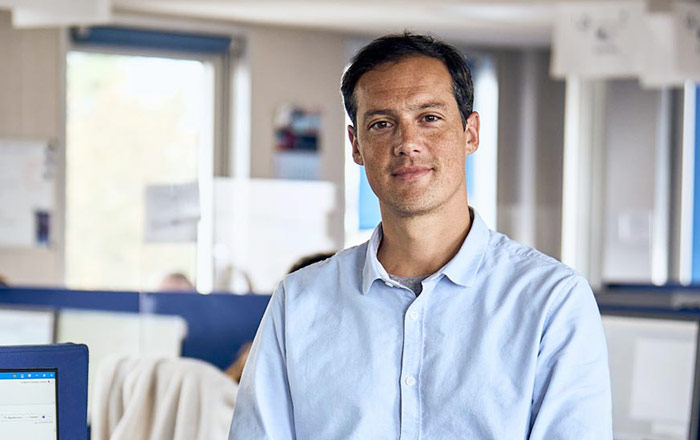
As part of our job profiles, we meet Damien, Multimodal Manager at Logi Ports Shuttle and Nord Ports Shuttle, two subsidiaries of Sogestran Logistics.
Hello Damien, can you tell us about your work at Sogestran Logistics?
I'm in charge of multimodal transport. With my team of five people, we organize transport operations between seaports and inland ports.
We select carriers on behalf of our customers, and optimize logistics by creating load plans. We then ensure that operations run smoothly.
We cover three areas: the Seine and the Rhône (Logi Ports Shuttle) and the North (Nord Ports Shuttle).
Our main customers are shipping companies. It's a real challenge, because we sell transport services to experts who master the sector themselves.
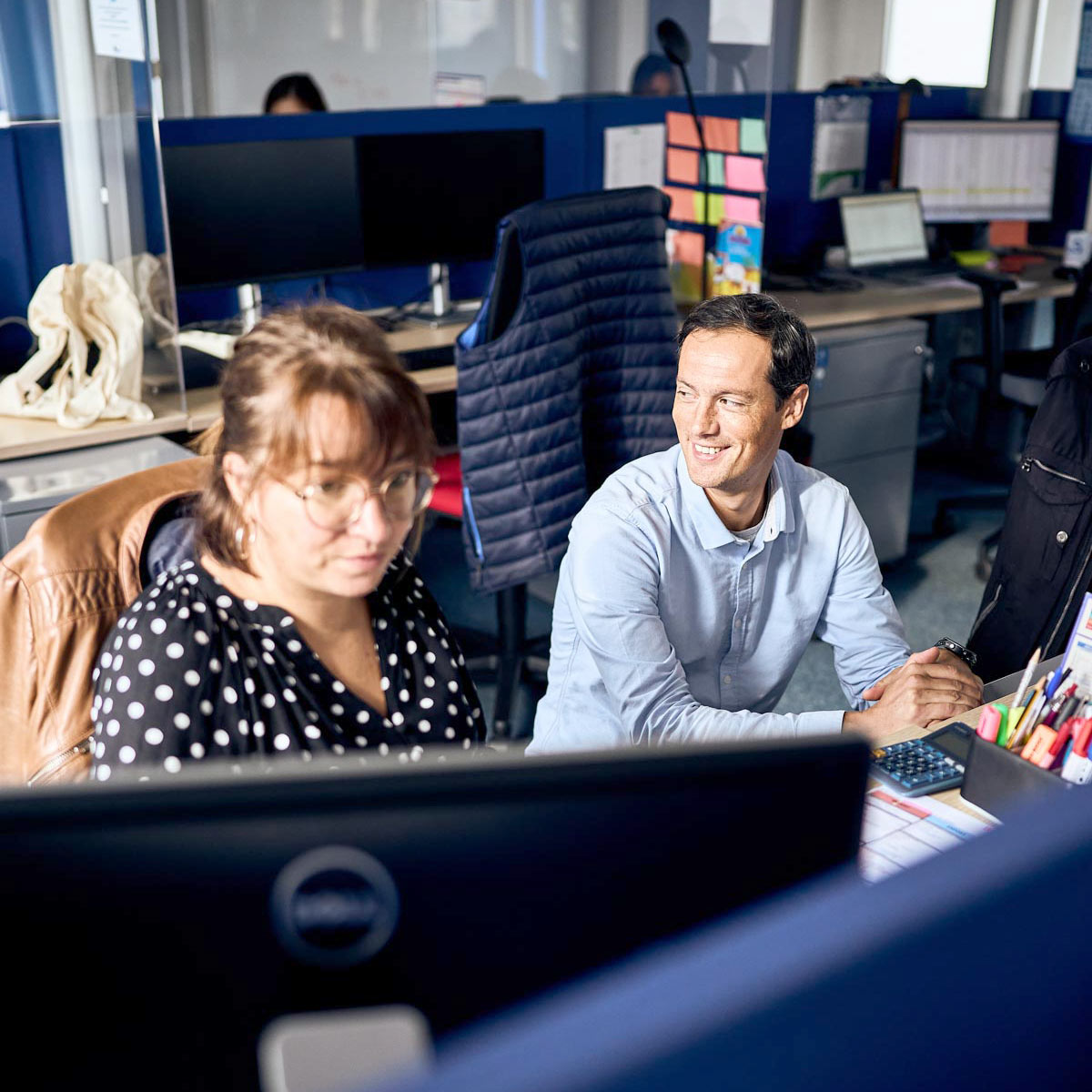
What is your career path?
My career path is rather eclectic. During the first part of my professional life, I experimented with different activities: a master's degree in environmental law, a position in a community of communes, then a contract as a warehouse handler and finally the management of a restaurant for six years.
At the age of thirty or so, my path became specialized in logistics, with a position as team leader in a company that offered me the opportunity to pursue a master's degree in logistics, which brought me back to school. Since then, I've accumulated a lot of experience as a freight forwarder before joining Sogestran.
What do you like about your job?
Given our position, our added value for customers lies in the quality of our service. However, there are many risks that can affect this service: a customs incident blocking a container, the unavailability of handlers on the docks, or a lack of capacity. There's no routine.
It's exhilarating to find solutions for our customers. You have to be reactive and tenacious in order to minimize the impact of financial contingencies linked to the service.
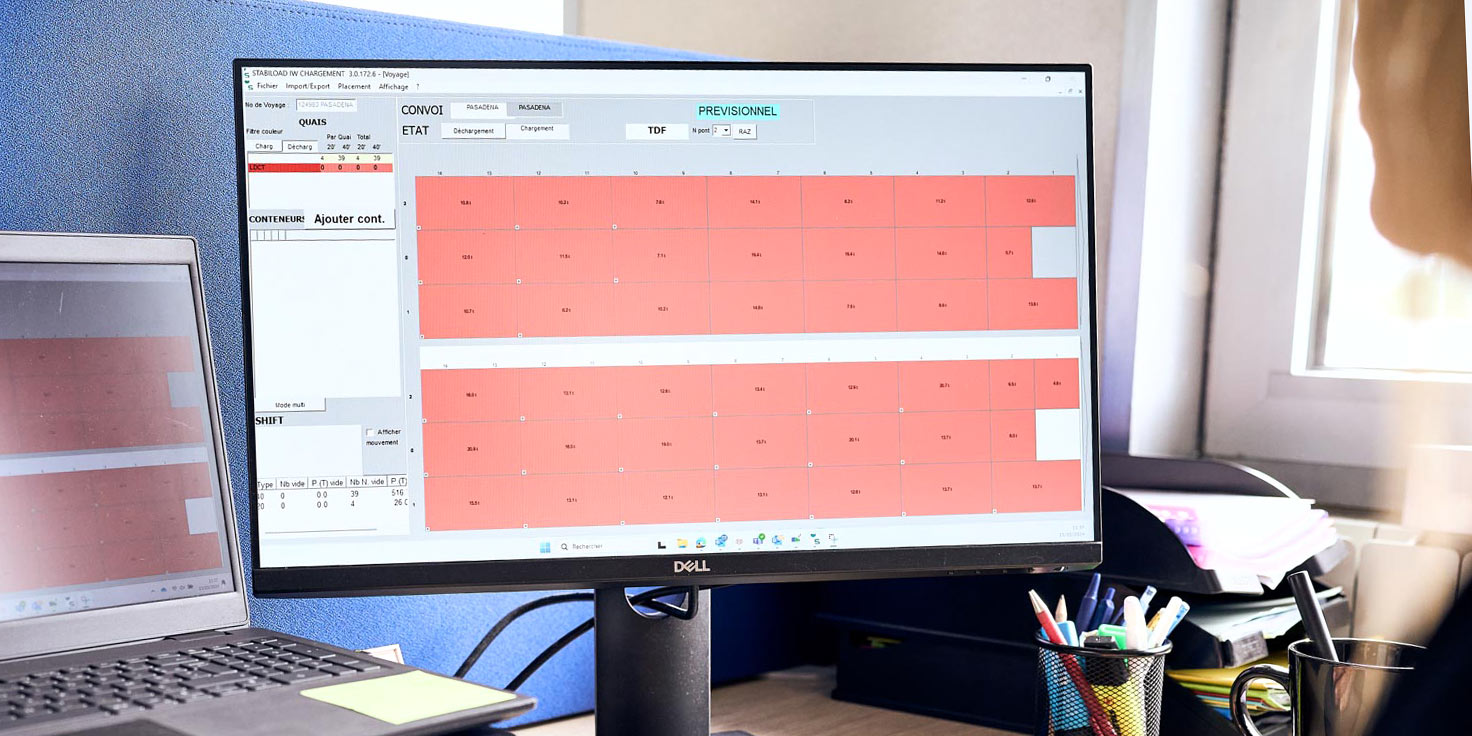
Testimony published in December 2024

Anthony, Road Operations Manager, tells us about his career and his job at Logi Ports Shuttle and Nord Ports Shuttle, subsidiaries of Sogestran Logistics.
Anthony, to begin with, what brought you to transport?
I have completed a vocational training certificate in transport. I started my career in the Land Army, where I served for five years, taking part in several overseas operations, some of which were transport-related (HGV license). After leaving the army, I worked as a dock attendant, where I drew up loading plans and checked containers.
I then joined Logi Seine, which became Sogestran Logistics in 2003. I evolved to the position of road operations manager, supported by three operations agents in charge of dispatching the activity. I've held this position for ten years.

What's your day-to-day life and your team's job like?
With my team, we plan the transport of containers over the last few kilometers, between the river boat and the warehouse.
We are in direct contact with the carriers. We negotiate rates, organize their schedules and manage contingencies. To give you an order of magnitude, we work with some thirty carriers in France and, for the Île-de-France region alone, schedule nearly 80 rounds a day. We manage two days of planning in advance.
We also take care of the administrative follow-up of the containers and complete each file with the invoicing of the service.
As you can see, there's no such thing as routine in my day-to-day work!
I'm also in charge of guiding and training the dispatchers, providing them with day-to-day operational support and problem-solving. In this business, it's rare for a day to go by without a hitch.

What qualities do you think are required for this job?
You need a good deal of empathy and charisma. Building a trust-based relationship with carriers is essential, helping them to organize their day in a coherent and realistic way. In the Paris region, with all the traffic, customer expectations often come up against ground reality. But you also have to know how to challenge them.
It's also important to be reactive and ingenious, to find solutions quickly and avoid delaying or breaking the supply chain.
What do you like best in the job?
I like the non-routine side and the adrenalin rising when the schedule becomes tense.
I also appreciate the human side: we establish a trust-based relationship with our carriers, whose daily lives on the road are not always easy.
Finally, training dispatchers and passing on the know-how of the profession is particularly important to me. When you're just starting out in this field, managing relationships with carriers can be tricky. That's why I enjoy accompanying new recruits, supporting their progress and watching them gain in confidence, week after week.

Testimony published in January 2025
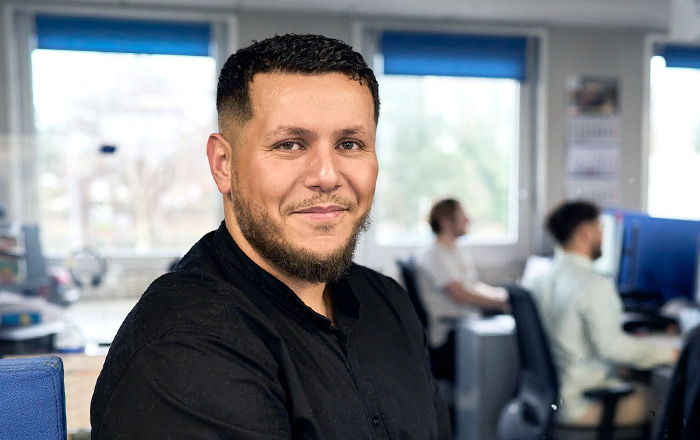
Hello Yassine, thank you for taking the time for this interview.
Can you tell us about your job and the role of your team?
Welcome to the platform!
To sum up the work of my team, we are the first point for operational contact with the customer, once the commercial relationship is engaged.
We receive, analyze and dispatch our customers' requests for container movements, working closely with Damien's team, in charge of managing river transport, and Anthony's team, responsible for road transport over the first or last kilometers.
We have two roles:
- internally, we are the voice of the customer to the operational departments,
- externally, we are the voice of operations to the customer.
Our aim is to strike the right balance between feasibility, customer satisfaction and management of the hazards inherent in our business, of which there's no shortage on a daily basis!
To ensure a high level of service and create a long-term business relationship, my team is committed to responding promptly to customers and handling issues with transparency. Efficient communication is the key: even in the event of unforeseen circumstances, if the customer is reassured and we give him visibility, his satisfaction is assured.

During our discussions, we can feel your great sense of customer relations. How did you reach your current position?
After completing a commercial training course (Bac+3) and a master's degree in international management, I worked for several years as a district manager in supermarkets, then as a store manager. For the past ten years, my approach has been focused on customers.
When I was given a chance to join Sogestran Logistics in order to develop the customer service department, I seized it as I like to get out of my comfort zone. I was familiar with customer relations, but not as much with transport. Thanks to the support of my management, I was able to develop my skills very quickly. It's now been three years!
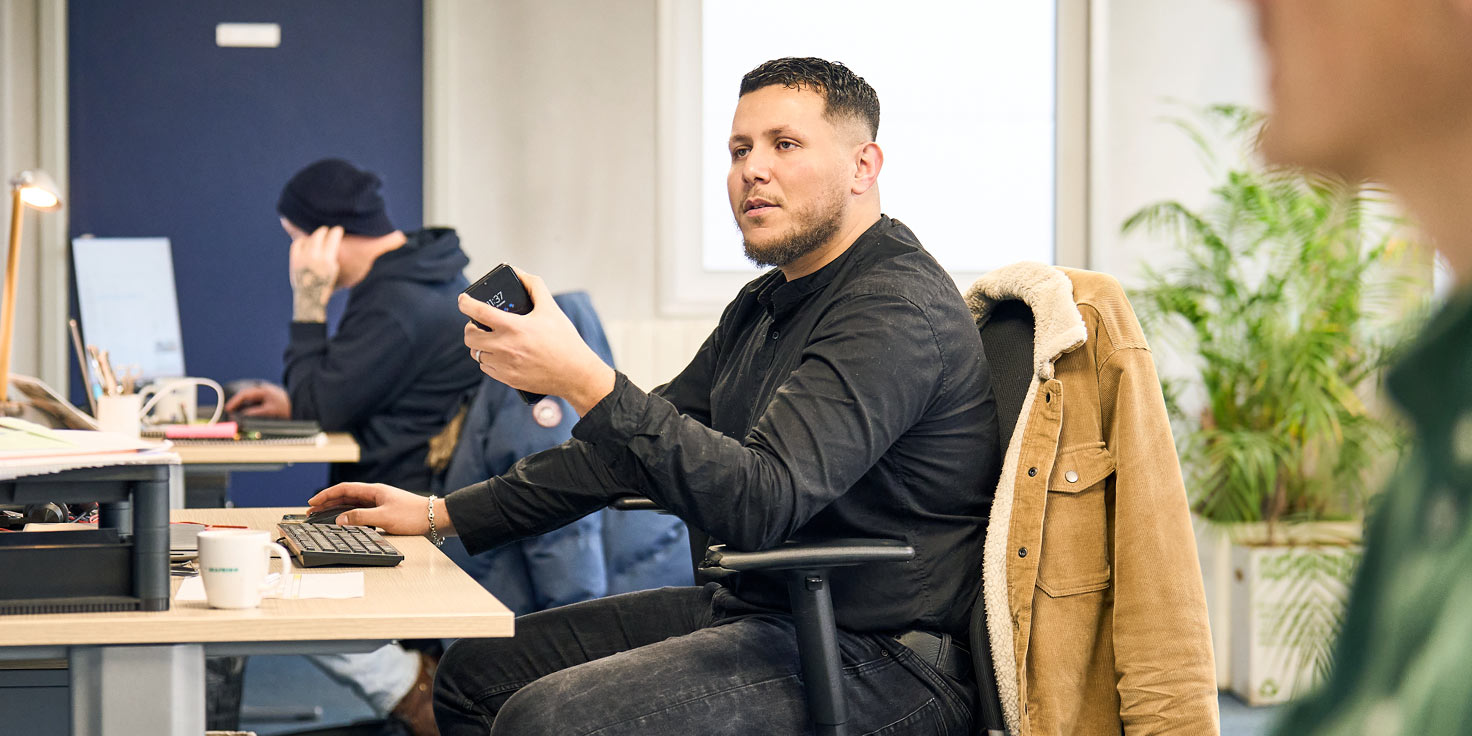
What do you like about your job?
In logistics, operations happen in rapid succession. You have to be ready at all times, because you jump from 0 to 100 very quickly. Responsiveness is key, especially on a platform like ours, with close links to the river and road operations. The workdays are intense and dynamic: there's never a dull moment!
When I hear customers call, explicitly naming a member of my team rather than simply asking for customer service, I know we've built up a real relationship of trust. That's what human relations are all about: responsiveness, advice and kindness.
Being able to hang up the phone knowing that I've turned a customer's frustration into satisfaction is extremely gratifying.
In my job, I'm sometimes the “pebble in the shoe” of my colleagues Damien and Anthony, being the voice of the customer. But we've managed to create a healthy working atmosphere, based on communication and an understanding of each other's stakes: this pushes us to challenge each other.
What qualities are you looking for in someone to work in your team?
Customer relations are above all a question of interpersonal skills, far more than technical skills. You have to enjoy talking to customers, because we are their first interlocutor.
Taking the time to understand operations, asking questions to colleagues or managers and, above all, letting your personality shine through is essential. The human touch and empathy play a key role. The diversity of profiles creates a unique complementarity.
And finally, an essential quality: being able to hold one's nerve, because the customer remains our absolute priority.
Testimony published in February 2025
Testimonies of Sogestran Industry team members:
The men and women who work in our teams are passionate - find out more about their professions below!

At Sandouville, near Le Havre in Normandy, TSN provides a full range of washing, repair and maintenance services for road tankers, tank containers on chassis and IBCs.
Today we meet Frédéric, who sheds some light on the repair and maintenance workshop for road tankers and IBCs.
How did you get to the position you hold today?
I've been working for TSN for over twenty years. I started out as a forklift driver and tank container operator at the company's other site in Gonfreville-l'Orcher.
I've evolved over the years. In 2017, I changed my role and site to join the road tanker and IBC business, recently acquired by the Sogestran group. After working as an operator, I became a workshop manager.
What does the repair and maintenance of road and IBC tanks involve?
We have different activities in the workshop:
For road tankers, we prepare and carry out the periodic regulatory tests, and we carry out troubleshooting and repairs (whatever the damage: a broken insulator, a bent support leg, a sunken tank, etc.).
For IBCs, we check, repair and modify equipments. We carry out the periodic tests, and also refurbish when the IBC changes its use or its customer.
What is an IBC?
An IBC is a small metal container holding 250 to 2,500 litres. The public is not familiar with IBCs as they are transported in covered lorries, so you can't see them. And yet they are used to transport everyday goods: food products (tomato sauce or fruit pulp, for example), cosmetics (creams and perfumes, for example) and chemicals.
What are your duties as a workshop manager?
I manage the workshop, organise the work of each member of the team and deal with customers, suppliers and sub-contractors.
We're a small team: four operators and an administrative assistant work with me under the supervision of the operations manager.
What do you like about your job?
What I enjoy about my job is that the work is diverse and never gets boring. Each tank is different and, depending on the client's needs, you have to adapt and figure out how to meet the specifications.
I don't like routine, so this suits me perfectly!
Watch a video of Frédéric's job:
Testimony published in February 2024

Fanny is a water treatment technician at TSN / Sogestran Industry.
A recent arrival at the company, Fanny has over 10 years' experience in the field.
Her job is to ensure the operation of the treatment systems for waste water generated by tank washing at TSN Sandouville and TSN Gonfreville l'Orcher.
The water treatment circuit at TSN
The water used for tank washing at TSN Sandouville and TSN Gonfreville l'Orcher is recovered and treated. The aim is to ensure that the water comes out clean, in compliance with the prefectoral regulation, and can be released into the Grand Canal du Havre.
To this end, the water passes through various types of filters and undergoes a physicochemical treatment, followed by a biological treatment. The facility treats 48,500 m³ per year (maximum 250 m³ per day).
How did you choose this profession?
I've always been interested in the environment. I did a BTS in water management and control as part of a traineeship. I'm used to saying, in a caricatural way, that what interests me in my job is the drop of water! How a drop of water is used in an industry and how it is treated to come out clean.
I think my job is a job for the future, because water is becoming a rare commodity, and treating wastewater is more than just a legal obligation; it's also an obligation to future generations.
Autonomy, versatility
What I like about my job is that I'm autonomous in my work, and that I can do lots of different things: sampling and analysis, placing orders, managing treatment in the biological tanks, etc.
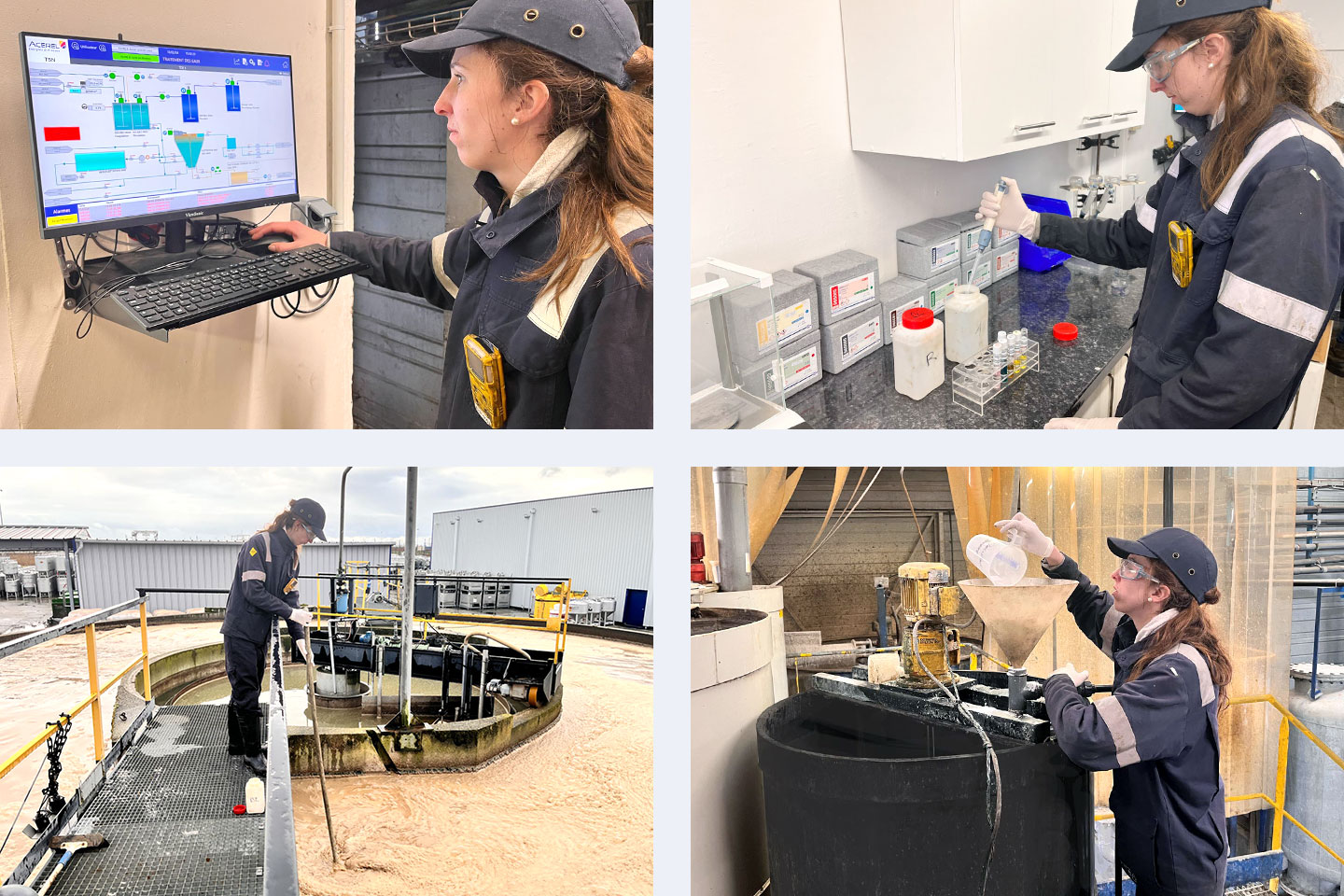
Observation skills
I have to be very keen to observe: I keep an eye on the supervision screen, which gives me information on all the facilities, but I'm also on the alert to visually check the various pieces of equipment. By combining the two, I can identify the source of any malfunction.
Constant attention to safety
I pay particular attention to safety. I work in blue and in addition, for each task I carry out, I think about the PPE I need to wear to be safe (protective goggles, gloves, etc.).
Women in the industry
I don't often come across women in my job. And yet there's just as much room for them as there is for men! My company TSN and the other Sogestran Industry subsidiaries recruit forklift truck operators and boilermakers, for example. These jobs can also be done by women!
I won't deny that in my career, I've sometimes had to show more motivation and demonstrate myself more than a man. But the more women we are, the less this will be the case.
TSN employs three water treatment technicians who work in shifts: 6am/1pm, 8am/3pm or 1pm/8pm.
Testimony published in March 2024

Nizar joined CARE in 2019 as a multi-skilled forklift operator
At Rogerville, near Le Havre, CARE is the first port storage and distribution centre for hazardous chemicals opened in France (whatever their packaging: drums, IBCs, big-bags, containers, etc.).
Hello Nizar, can you tell us more about your career?
I've been a CARE employee since 2019. Before that, I worked in automotive production and logistics. I wanted to move on, so I passed my CACES (certificate of aptitude for safe driving), which enabled me to join CARE.
What are your duties as a multi-skilled forklift operator?
I have several tasks.
On arrival of the lorries, I unload the goods and check the quantities. I carry them using forklift trucks (or reach stackers) and put them away, scanning the barcodes, in a defined place. The goods will then be retrieved as required.
When a customer order arrives, I go and pick up the stored goods, then scan them and prepare them for dispatch (depending on requirements, I may put them on pallets, film them, or re-label them according to specific customer requests) and check everything before departure. I then load the lorries.
On the container storage area: an order arrives on a tablet which enables us to load the requested container and do the interchange in conjunction with the administrative department.
What I like is that I get to do a variety of tasks, so it's not a dull job.
At Care, I benefited from in-house training to acquire new levels of CACES, which certify that I can drive several types of forklift trucks (tractor and platform trucks, forklift trucks with a capacity of six tons or more, etc.), as well as training in chemical hazards, the application of emergency procedures and OHS.
What's your work schedule like?
I work four days a week, either from 9am to 6.30pm or from 7am to 4.30pm.
What are the key skills needed to be a good forklift driver?
Experience and thoroughness are two essential qualities for a good all-round forklift operator.
Of course, you need to know how to drive forklift trucks and reach stackers, but I'd like to emphasise that you need to be rigorous.
First of all, because we have to be meticulous when receiving and storing goods, and when preparing and labelling orders.
And second, we have to work in complete safety:
- for yourself (I've been trained in chemical hazards, you have to wear safety equipment, for example);
- and for others (you have to drive carefully and pay attention to everything going on around you, you can't go fast at all costs: you're handling dangerous chemicals, you have to take the time to do it properly).
Fabrice, Nizar's manager, adds to these qualities: To be a good all-round forklift operator, you need experience, rigour and dexterity when driving forklift trucks.
You also need good interpersonal skills to work as part of a team, and extra vigilance when handling chemicals.





Photos © Sogestran Group & Samuel Salamagnon
Testimony published in April 2024
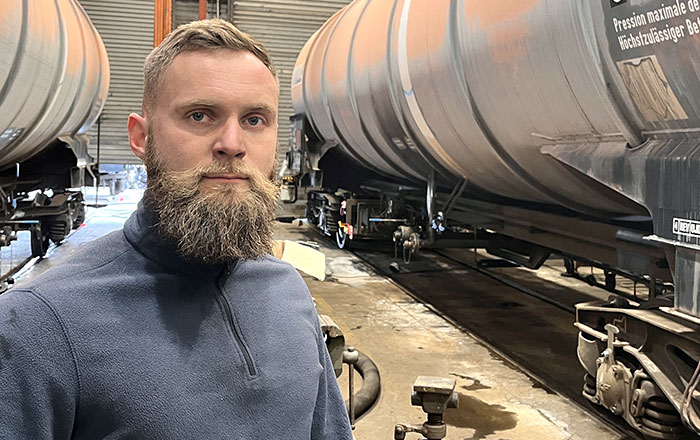
Martin has been working at Freeman Industrie since 2018, and is now a wagon technician.
In Béziers, Freeman Industrie is an overhaul, repair, conversion and reconditioning workshop for freight wagons.
The site has a storage capacity of 450 wagons spread over 4.5 hectares.
The target is 750 wagons overhauled by 2024.
Mobile teams can operate on site in New Aquitaine, Occitania and Normandy.
The company also carries out statutory tests on road tankers, and features a high-capacity surface treatment workshop (shot-blasting and painting).
Hello Martin, can you tell us about your career?
Before joining the Sogestran group, I worked in several fields: vineyards, beekeeping and orders preparation.
I was 22 when I joined Freeman Industrie, and was trained by the senior staff in various jobs (retrofitting, overhaul, etc.). I then joined the mobile teams in Bordeaux. For the last four years, I've been with the OVs.
What is your job?
I take care of the tank once it has been cleaned and vented. I carry out a complete check-up: I check the joints, screws, flanges and tightness, and repair as necessary. I then carry out the periodic regulatory tests.
How much time do you spend on a wagon?
For a major overhaul, carried out on a wagon every eight years, I spend between 4 and 6 hours. The wagon is then completely filled with water and checked by an outside organization.
What do you like about your job?
First and foremost, it's the atmosphere! There are around forty of us and the atmosphere is great. I was trained by my boss, who passed on to me the know-how he'd acquired over the years.
I now work in tandem with a colleague who is very good at mechanics. We complement each other, understand each other quickly and have the satisfaction of carrying out specific repairs that require a bit of ingenuity.
Another essential point for me is that I'm never bored. Every wagon is different, it's never routine.
What skills are required to do your job?
You need mechanical knowledge, logic and strength.
Watch a video preview of Martin's job:
Testimony published in July 2024
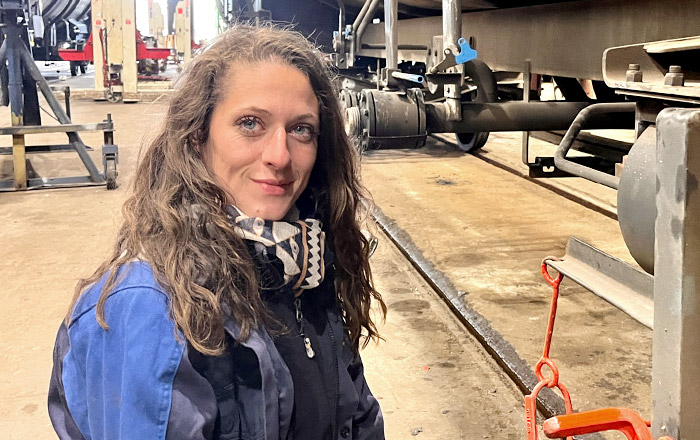
In Béziers, Freeman Industrie is a workshop specializing in the overhaul, repair, transformation and reconditioning of freight wagons. Mobile teams are available to work on site in Occitanie and Normandy.
The company also carries out regulatory tests on road tankers, and has a high-capacity surface treatment workshop (shot-blasting and painting).
Today, we meet Ludivine, who has been a letterer in the workshop for one year.
Hello Ludivine, can you tell us about your job at Freeman Industrie?
I'm a letterer, which means that I write the regulatory information on the wagon, for example: registration number, tare weight, maximum load capacity, length excluding buffers, type of brake and braking effort, type of products contained in the wagon...
I take over after the washing, and complete what you might call the “final packaging”!
I work with two different techniques:
- painting ;
- stickers.
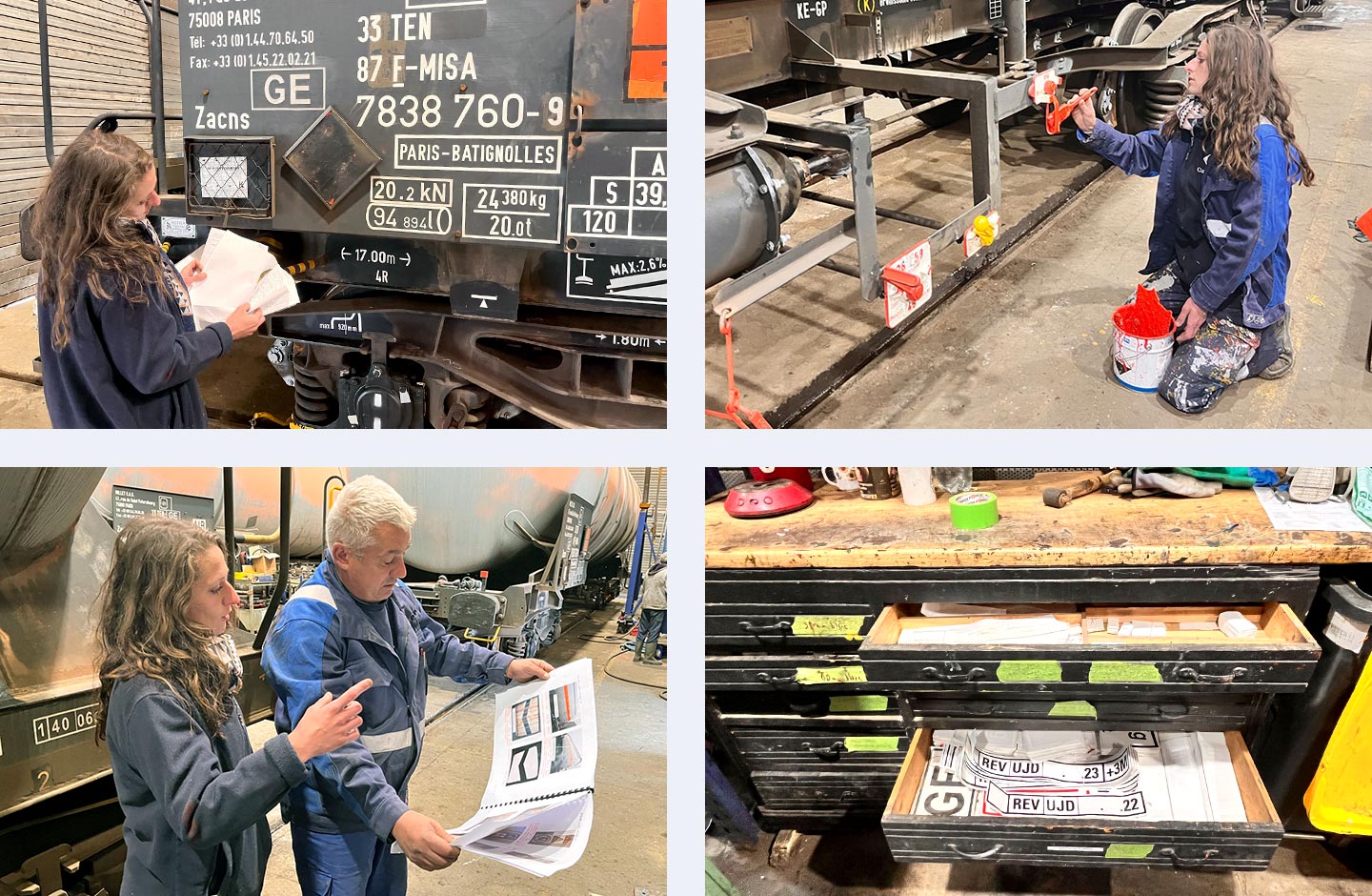
How did you get into this original profession?
My career path is a bit eclectic! After a degree in psychology, I worked in retail. Then I felt the need for a change, so I answered the job offer from Freeman Industrie out of curiosity, since I didn't know this profession at all.
What do you like about this job, which is very different from those you've worked in before?
When I arrived, I was trained by a colleague who then moved on to other functions and needed to be replaced. I liked this “companionship” spirit. I started to master the automatisms within a few months, but my tutor was never far away and he always checked the final result. That was reassuring.
I also appreciate the fact that it's not assembly-line work: each marking is different, each client has its own specificities (color coding, for example).
Finally, my working hours allow me for a good work/life balance: Monday to Friday, 8am to 12pm and 1pm to 4pm.
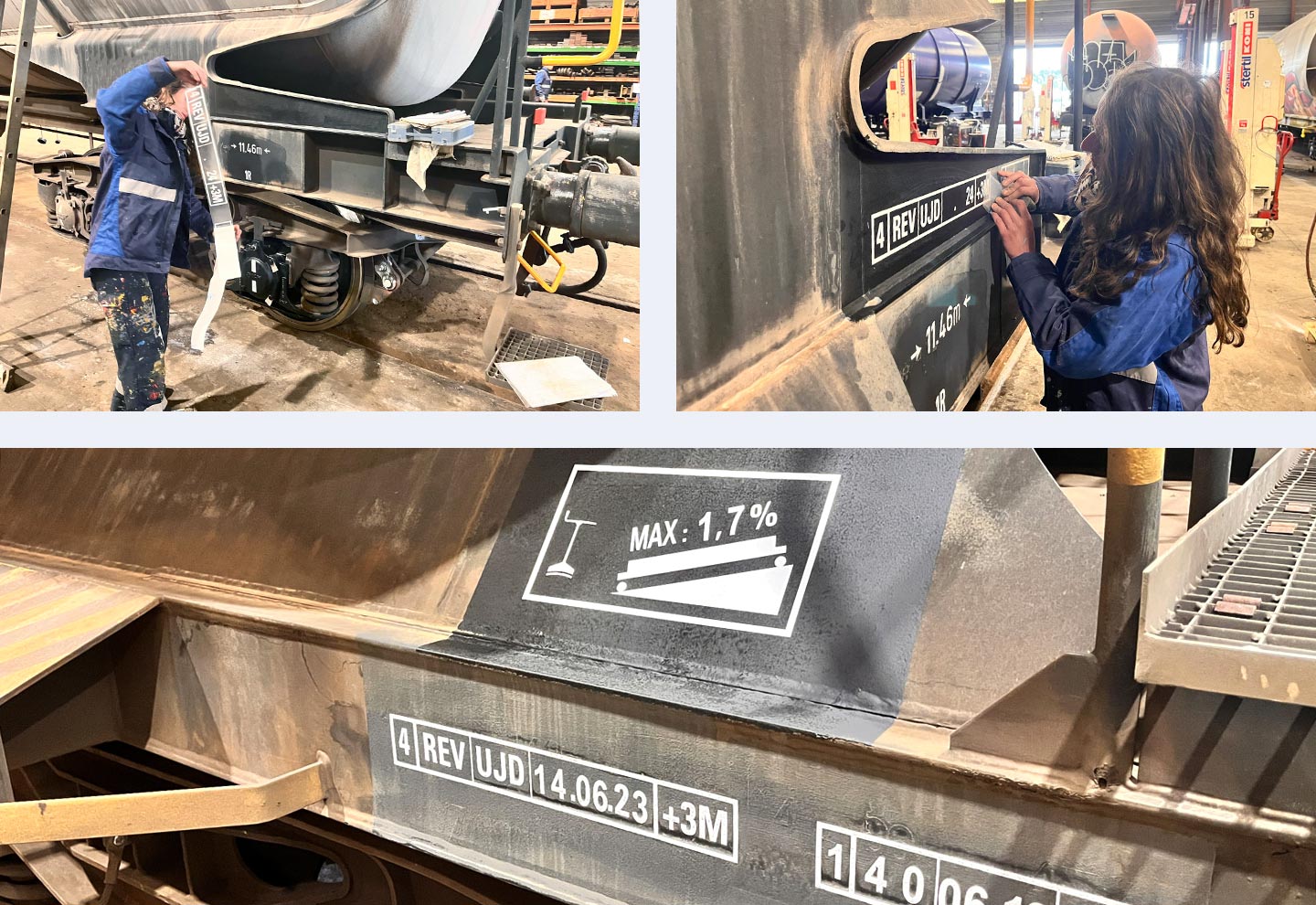
A woman in the industry? It's still rare... Is this a subject for you?
I'm a strong character person, so I had no trouble fitting in within the team. There's a team spirit in the workshop: each of us has his or her own specialty, and our work is complementary. Whether you're a man or woman, there's no issue.
Physically, I have no particular difficulties. My job is quite physical, because I walk a lot during my working day and I carry paint cans, but it's within my means!
Testimony published in March 2025
Our locations

Sites and activity areas of the Sogestran Group
Head Office: Le Havre (France)
Inland activities:
- Seine/Oise
- Rhône/Saône
- Loire
- Northern France
- Belgium
- Holland
- Danube
Head office of maritime entities:
- Nantes (France)
- Lavéra (France)
- Cayenne (Guyane)
Services to Industries: Le Havre (France)
Our job offers / Spontaneous applications
Join the Sogestran Group!
Consult our job offers or send us your application (French language sections).
JOB OFFERS SPONTANEOUS APPLICATION